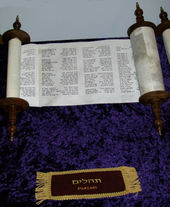Psalm 130
Sustinuit anima mea in verbo eius: A marginal note in the Masoretic Text tradition indicates that Psalm 130:2 is the middle of the whole Ketuvim (Book of Writings) section in Hebrew.
[6] Psalm 130 is recited according to Nusach Sefard as part of the liturgy for the High Holidays, sung responsively before the open Torah ark during the morning service from Rosh Hashanah until Yom Kippur.
[15] In the current Liturgy of the Hours, the psalm is recited or sung at vespers on the Saturday of the fourth week of the four-weekly cycle of liturgical prayers, and on Wednesday evenings.
[16] Pope Clement XII encouraged Christians through his brief Caelestes Ecclesiae thesauros promulgated on August 14, 1736, to pray daily for the souls in Purgatory inviting all to kneel at the first hour of nightfall and devoutly recite Psalm 130 with a Requiem aeternam at the end of it.
[19] In the Church of England's Book of Common Prayer, this psalm is appointed to be read on the evening of the twenty-seventh day of the month,[20] as well as at Evensong on Ash Wednesday.
Poems by Alfred Tennyson, Elizabeth Barrett Browning, Charles Baudelaire, Christina Rossetti, C. S. Lewis,[22] Georg Trakl, Dorothy Parker and José Cardoso Pires bear the same title.
In the novel Fires on the Plain by Shōhei Ōoka, the character Tamura makes reference to the psalm's first line "De profundis clamavi" in a dream sequence.
